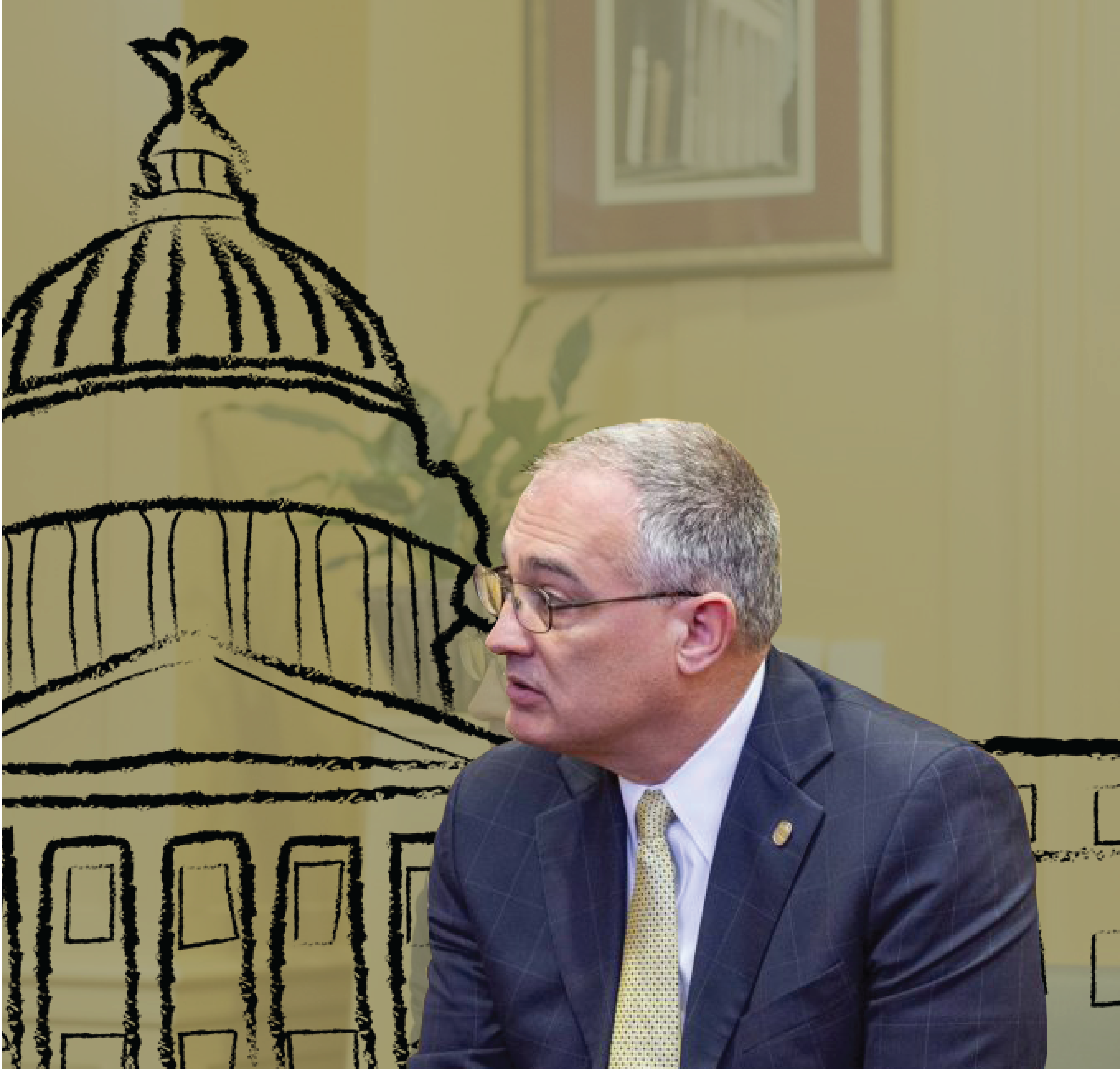
Illustration by Devna Bose
Larry Sparks is an insider, and he thinks that’s just what the university needs right now.
He became the school’s interim chancellor on Jan. 2, departing from the Office of Administration and Finance to replace Jeffrey Vitter, the university’s shortest-tenured chancellor.
“What’s needed most is consistency,” Sparks said last week. “There’s not a lot of time to learn and to get up to speed about relationships and priorities in an interim role to someone coming in from the outside.”
To be successful, a chancellor should form a relationship with the state. Interim Chancellor Sparks is conscious of the money and power at play in the state college board, and he exudes an understanding of how exactly it all works. He spent 10 years as an employee of the Institutions of Higher Learning, and he quite literally wrote the institution’s funding formula.
It looks like Sparks has the trust of the state’s leadership, and he’s candid about his connections to one of Mississippi’s most important institutions. Because of his deep roots in higher education finances, he sees the university for what it means in terms of statewide gains and losses. He’s not necessarily ignoring the day-to-day needs of the student body, but he’s certainly focused on the bigger picture.
How will we get to where we need to be 20 years from now? Interim Chancellor Sparks thinks it’s by investing in enrollment among Mississippians, physically developing our campus resources and upholding relationships with powerful people across the state.
AN ACCIDENTAL JOURNEY
Ole Miss has always been a part of Larry Sparks’s life, but he never thought he’d be in this position.
The Oxford native said he initially wanted to work at the university because of the tuition benefits he’d receive while earning his master’s degree. After he entered the industry of higher education, however, he never found his way out. He’s been at Ole Miss since 1997 and previously served as deputy assistant commissioner for finance and administration in the IHL.
While he says he never planned to become so entrenched in statewide higher education, Sparks is definitely happy where he is.
“It was an accidental journey, which sometimes are the best and pay the best dividends and rewards,” Sparks said.
His selection as interim chancellor may be a reward for his service to the university and, more importantly, to the state education board.
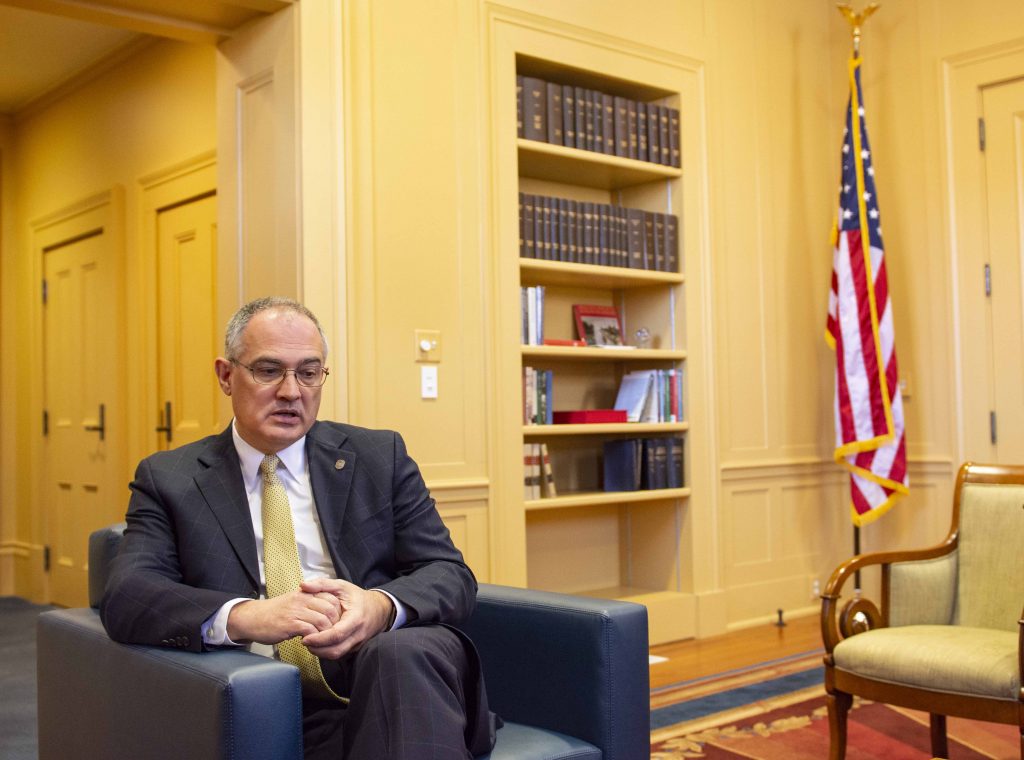
Larry Sparks became the interim chancellor of the University of Mississippi on Jan. 2. Sparks plans to remain the interim for one year while the state IHL board searches for a permanent chancellor. Photo by Christian Johnson
Sparks worked for the IHL starting in the late 1980s and was “deeply involved” in creating the formula the IHL uses to fund its eight universities. The IHL disburses funds based on academic success and cost of instruction. In a Feb. 2018 interview, Chancellor Jeffrey Vitter said Ole Miss was being underfunded according to what the formula suggests. Sparks said the university has been “well-managed” financially.
“Would we welcome an increase in appropriations? Absolutely. But I can tell you, I understand the challenges our legislature faces and the size of our economy in the state,” Sparks said.
Sparks has worked at Ole Miss since the late nineties, and in his last 12 years as vice chancellor for administration and finance, he’s seemingly done it all. His former job description on the school’s website ranges from budget and landscape services to campus mail and airport operations.
His passion is rooted in numbers, and he calls himself a “math nerd.” Sparks knows that at a school as large and complex as Ole Miss, the specifics are important.
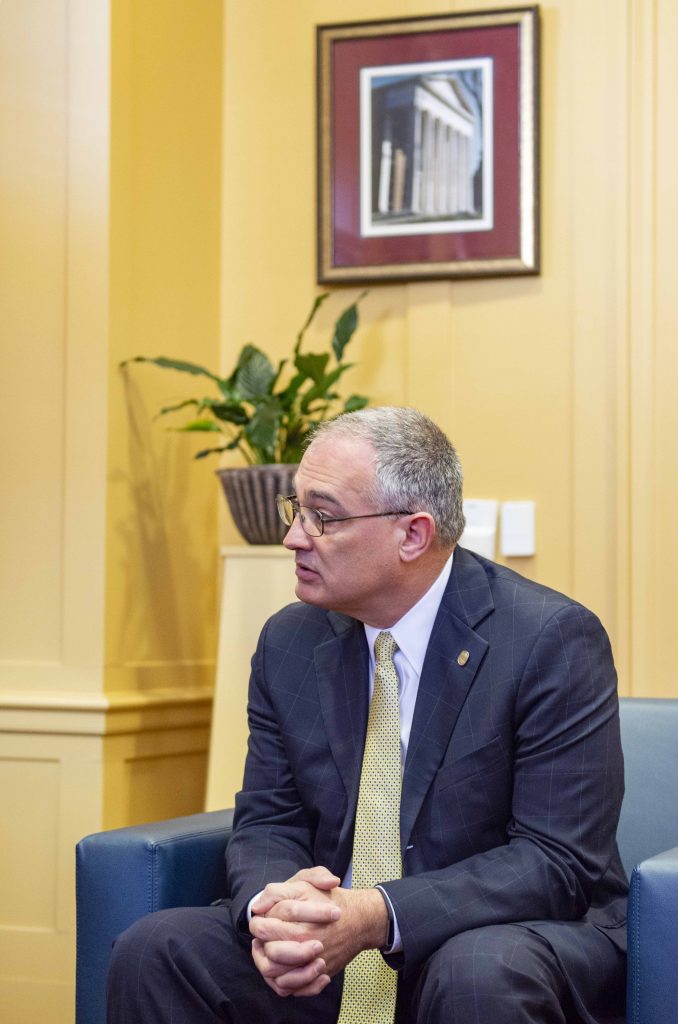
Larry Sparks discusses the university’s future in the Lyceum on Jan. 31. Photo by Christian Johnson
“We don’t just buy utilities; we are the utility,” Sparks said. “It’s a different aspect, and individuals outside the university may not think of that, just as an added level of complexity.”
He understands the role the university plays in the lives of students every day, from housing to food services and healthcare, but also the greater role a place like Ole Miss is expected to play in advancing the state. Sparks’s perspective could be a result of his close relationship with the state’s top decision makers, from the legislature to the IHL.
“I think one of the things that has helped tremendously is the number of years I’ve been here, the relationships I’ve built and — no other way to say it — the love of the institution,” Sparks said.
Though he seems keen to have Ole Miss provide what the state expects out of its flagship university, that’s not why Sparks accepted the job.
“What convinced me, is that I have a love for this place,” Sparks said. “I want this place to continue to improve … and I thought one of the best choices was to have someone that has been here and has relationships and just can continue.”
THE ONE-YEAR PLAN
The last time Ole Miss sought to replace a chancellor, Morris Stocks served as the interim chancellor for seven months. During that time, the university decided to remove the Mississippi state flag from campus.
The first step in the IHL’s search for a new chancellor is for the board to form a Board Search Committee. Caron Blanton, director of communications for the IHL, said the board has not yet appointed a committee.
“The time a search takes varies from search to search, depending on when it begins and how it fits with the academic calendar,” Blanton said.
Sparks said he plans to serve one year as interim chancellor and hopes to accomplish his mission of righting the ship in that time. He’ll return to his post in the Office of Administration and Finance after his interim period, which is being headed by Assistant Vice Chancellor for Administration and Human Resources Clay Jones and Controller Nina Jones in his absence.
While Sparks’s plans in office are based on this one-year model, the time frame is ultimately decided by the IHL board.
“If it is a shorter or longer period of time, then we’ll deal with that when it happens,” Sparks said.
Leveling out enrollment, bringing in more Mississippi students and strengthening relations with the state seem to be high on Sparks’s list of “things we want to accomplish.” He said that, in the last several years, he and the upper administration have had to manage an “explosion in growth” that the university was unprepared for.
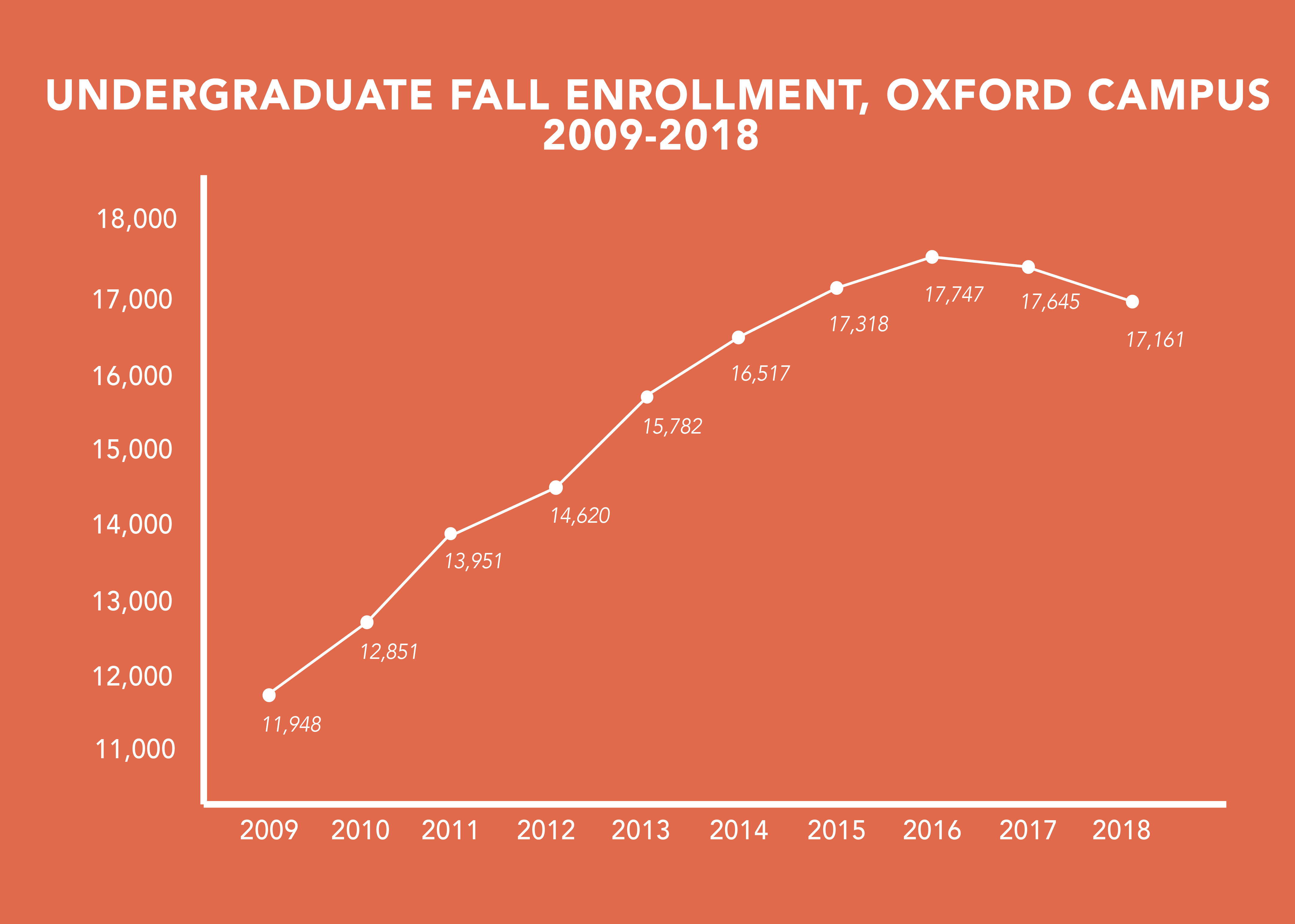
Graphic by Hayden Benge
Between fall 2003 and fall 2013, enrollment on the Oxford campus climbed from 12,950 to 18,427. That upward trend proved inconsistent and essentially, unmanageable. Since then, enrollment has stalled and leveled out.
“We made a conscious decision. We put metrics in place that could help us in terms of managing the out-of-state numbers. I didn’t say decline, but to manage the growth, the level of growth,” Sparks said.
Sparks knows Ole Miss needs to recruit out-of-state students, but he’s passionate about growing the university’s in-state reputation. He said he wants to have a spot for every Mississippian who applies and is eligible for admission.
“What I’m saying is that we are looking to invest more into the recruitment of Mississippi students,” he said.
This push for in-state enrollment points to Sparks’s goal of building infrastructure statewide and working hand-in-hand with the state government to do so.
“We also need to continue relationships with those that support us externally, whether it be legislative or it be those that are interested in helping the institution,” Sparks said.
LOOKING AHEAD
Though he’s only planning for one year in the office, Interim Chancellor Sparks wants to focus on challenges much further down the line.
“You can’t make decisions based on what you think is best for the next 20 minutes or the next 20 days. You’ve got to be looking at what’s in the best long-term interest of the university,” Sparks said.
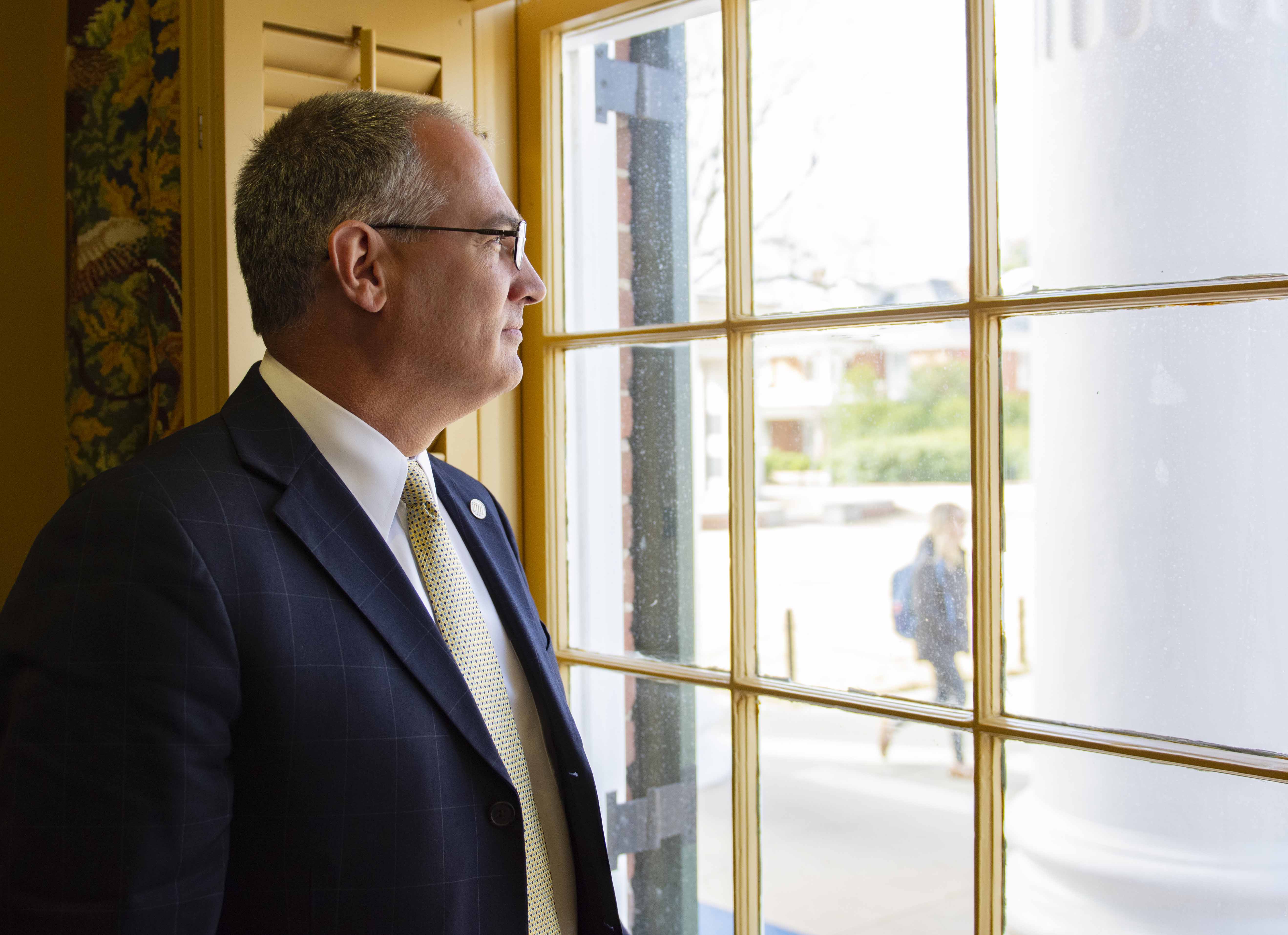
Larry Sparks poses in the Lyceum on Jan. 31. Photo by Christian Johnson
For Sparks, many of the university’s long-term interests involve building infrastructure for a larger and more modern student body.
Construction projects at the student union and South Campus Recreation Center should be complete before June, but Sparks has his eye on a much bigger beast. For years, the university has been preparing to build a STEM-focused hub in the middle of campus, between Vaught-Hemingway and the Grove.
“That is the last space left in our science corridor, our last building site, and we’re taking this very seriously,” Sparks said. “We’ve got to get it right the first time.”
According to Sparks, the university is still “working on designs” for the building and is looking to secure more funds. The STEM building’s basement would serve as a central home for the university’s utilities and data processing, and Sparks said he hopes to reserve an additional top floor for future use.
“I’ve asked that, in terms of our fundraising efforts as they relate to capital projects, let’s put a focus on the STEM facility group,” he said.
The promise of a state-of-the-art technology hub in the center of campus isn’t a new one, but it’s one that Sparks sees as vital to the university’s future.
“We have an opportunity here that may or may not occur during my interim but that is one of the most important buildings for us and for our future,” he said. “It’s imperative that we proceed with that facility.”
When the IHL’s search process formally begins, Sparks won’t be considered for the job. It’s in the IHL laws that the interim chancellor may not be selected for the permanent position. He will, however, more than likely be asked for his input on the candidates. Sparks said he’d like to see someone in the job who understands how important a strong relationship with the state government is.
“This is a relationship-based state. So (I’d like to see) someone that’s good with relationships but also someone that has experience managing and leading complex organizations such as Ole Miss,” Sparks said.
As far as student representation in the chancellor search, the IHL offers little opportunity for direct involvement.
“The first way a student can be involved in the search is to participate in listening sessions that the board of trustees will hold on campus,” Blanton said. “The date has not been set yet, but we will announce the date and other details once it has been set.”
Though he says he never planned to be the chancellor of Ole Miss, Larry Sparks feels prepared for the interim job. His leadership style will likely be one of big-picture thinking and measured approaches to modern issues, and his eye will be on the money.
“You may have some definitive goals and aspirations in your mind, but be open because opportunities may present themselves that you never dreamed up and you never knew existed, and that’s how I can define this one,” Sparks said.






